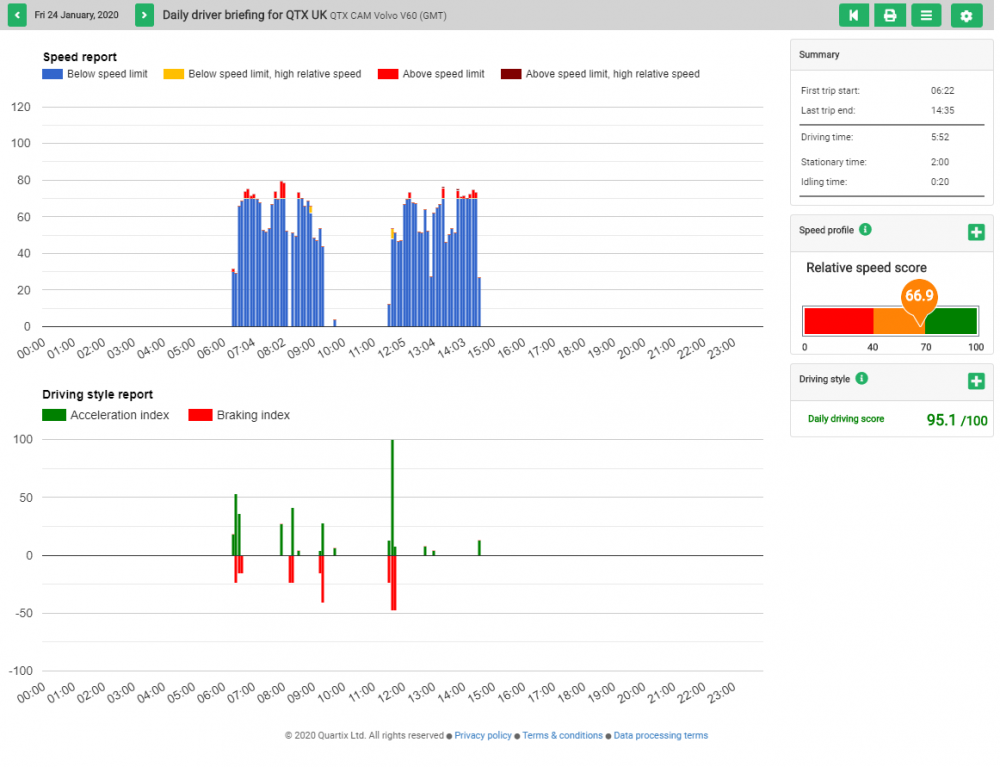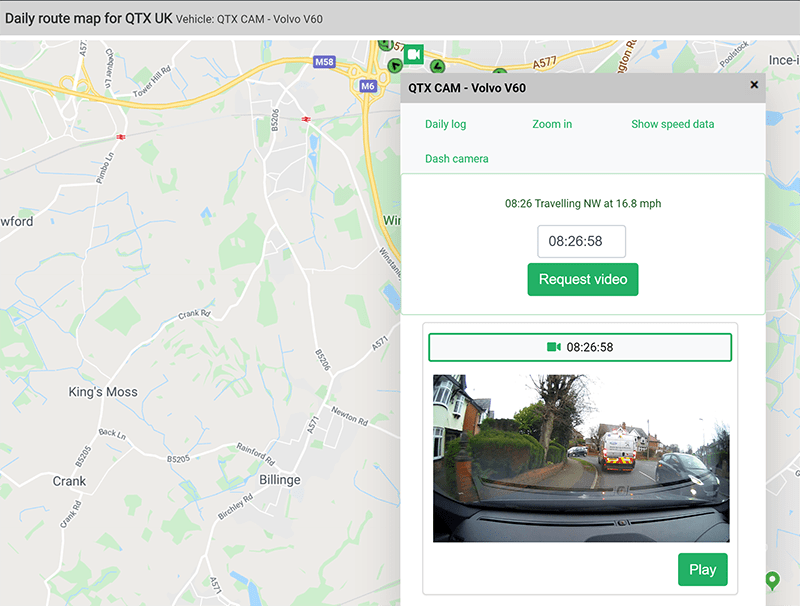Every minute of engine idling costs your business money. Whether you’re running a fleet of five vehicles or 500 vehicles, it’s worth taking the time to understand what happens when drivers leave engines running without need. A single hour of idling wastes roughly £2.82 in fuel (4.7 p per minute), and releases up to 5.26 kg of CO₂, considering the average UK diesel price is around 140.26 pence per litre as of 30 June 2025. Reducing engine idle time protects your business’ profit margins, extends engine life and helps tackle air pollution.
Did you know? Rule 123 of The Highway Code states that “drivers must not leave a parked vehicle unattended with the engine running or leave a vehicle engine running unnecessarily while the vehicle is stationary on a public road”.
So how can businesses tackle engine idling in their company vehicles? Fortunately, the Quartix vehicle tracking system identifies when your vehicles are left idling, so that you can encourage better habits and start seeing the benefits. Read on to learn more.
Why should you be concerned about engine idling?
While engine idling may seem harmless, it contributes to air pollution, shortens engine life and wastes fuel.
Modern engines are designed to run at operating temperature, not tick over. When they idle:
- Fuel burns inefficiently, creating carbon build-up that shortens engine life.
- CO₂, nitrogen oxides and particulates concentrate around vehicles and people, especially near schools and worksites.
- Idling for more than 30 seconds usually wastes more fuel than a restart.
The cost to your business
In a mixed-fuel fleet with various vehicle types, engine idling will cost at least 3p per minute. Over the course of a year, if one driver idles for just 10 minutes per day, over £120 of fuel is wasted. When more drivers are involved, excessive idling, and different vehicle or fuel types, this can quickly become a huge drain on operational costs.
If you run a 50-van service fleet and drivers let engines idle for 30 minutes each working day, they’ll consume roughly an extra 1,300 L of diesel and £1,800 of fuel each month at current prices. An idling HGV wastes ~2L diesel/hr.
But the effects of idling don’t stop at wasted fuel. Engine idle time is often referred to as ‘ghost mileage’ – your vehicle is working hard but the miles aren’t being covered. Because engines don’t perform optimally when ticking over, just one minute in idle-mode actually creates the equivalent of two miles of engine wear!
So, between engine wear and fuel consumption, letting drivers get in the habit of letting their engines idle creates a sizeable hidden cost.
The environmental cost
Engine idling is a major contributing factor to worldwide air pollution. Exhaust fumes from a running vehicle contain nіtrogеn оxіdеѕ (NOx), volatіlе organic соmроundѕ, particulate mаttеr, саrbоn mоnоxіdе аnd саrbоn dіоxіde. All of these are released into the atmosphere in excessive amounts when a vehicle is idlіng. These pollutants don’t just affесt оur еnvіronmеnt, but also our health.
Take our example of an average HGV consuming about 2 litres of fuel per hour in idle-mode. That idling HGV can emit 20 times more pollution than a vehicle travelling at 30 miles per hour.
When left idling for just 15 minutes:
- A petrol small-to-family size car emits ~250 g CO₂
- A diesel LGV emits ~420 g CO₂
- A diesel HGV emits more than 1 kg CO₂, and higher NOₓ fractions
By reducing your engine idling, you can drastically reduce your carbon footprint and make a positive impact on the environment and limit human exposure to dangerous gases.
Are there penalties for idling?
Councils are working to raise awareness about the harmful effects of idling and encourage drivers to turn off their engines. Many councils now conduct roadside checks as part of their anti-idling initiative, often near schools and construction sites, so it’s a good idea to communicate this to your teams and keep a close eye on idling across your fleet. If a driver refuses to turn their engine off when asked, councils can issue fixed penalty and £20 on-the-spot fines, rising to £40–£80 if unpaid.
Simple techniques to cut down on engine idling
There are some simple techniques you can use to reduce engine idling, such as turning off your engine when waiting in line or parked for more than a minute. Planning your route before hitting the road can help you avoid heavy traffic and reduce the amount of time you spend idling in your vehicle.
- Adopt a 60-second rule: if you’re stationary for a minute, switch off.
- Choose vehicles with modern stop-start systems to save fuel and battery wear.
- Install auxiliary heaters/APUs for drivers to use in rest breaks in hot or cold weather.
- Plan smarter routes to reduce congestion dwell times.
- Use a fleet tracking system to flag prolonged idle events.
- Coach & incentivise drivers to reduce their idle-times and reward improvement.
Remember, cutting just 10 min of idle time per vehicle per day in a 25-van fleet saves ~£7,250 in fuel annually (based on 3p/min).
How can vehicle tracking can help
Our vehicle tracking system lets you monitor idle time and identify areas where you and your drivers can make improvements to bring that time down. In addition, vehicle tracking can also provide insights into:
- Fuel consumption
- Driver behaviour and
- Vehicle maintenance needs.
This allows for more informed decision-making to further reduce fuel waste and improve the bottom line.

“We use Quartix to measure driver performance, MPG and carbon emissions alongside accident statistics, maintenance costs and insurance claims. These KPIs give us a complete picture of the overall progress and show just how much of a difference the project is making. We’ve upskilled our drivers and improved their wellbeing, reduced costs and improved our carbon efficiency – and got a far better handle on our operations in the process.” – Scott Logan, W J Roadmarkings
Engine idling may seem trivial, yet each idling hour uses unnecessary fuel, accelerates maintenance wear and breaks the highway code. Leveraging your telematics data, with firm policies and driver buy-in, you can quickly save thousands of pounds, reduce your fleet’s carbon footprint and stay compliant.
Ready to see your fleet’s real idle-time? Book a demo with our experts and we’ll help you drive down your fleet costs and emissions.





